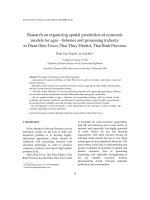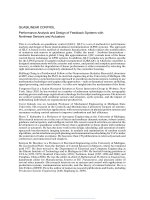Lecture Development economics - Lecture 8: Measurement of economic development with good governance and humane governance Index
Bạn đang xem bản rút gọn của tài liệu. Xem và tải ngay bản đầy đủ của tài liệu tại đây (183.42 KB, 28 trang )
Measurement of Economic
Development with Good
Governance and Humane
Governance Index
Lecture 8
Introduction:
In the present day's 'Good Governance' has assumed a
reasonable importance. The good governance is
also known as Humane Governance.
The concept of humane governance is the summation of
good economic governance, good political governance
and good civic governance.
The experts agree that good governance is not imposed
by the elites, rather it is framed by the people of a
country. As a result of good governance the weakest
persons of the society will be protected and they will
be saved from molestation in their daily life.
2
In South Asian countries the political democracy is yet to
have its roots and there exists a big gap in the rulers
and the subjects.
This state of affairs can be attributed to low level of
education, the discriminatory behavior regarding
women and minorities, the imperialism, feudalism,
superstitions and weak institutional set-up. Such all
results in Bad-Governance or
Mis-Governance.
Thus, in the early years of 1990 the economists started
associating economic development with good
governance.
In other words, economic development can possibly be
attained if the developing countries change their
existing social, political and economic system. Such all
3
change is called good governance or humane
Definition of Governance as given by UNDP
"Governance is such a system of economic, political and
administrative authority which makes possible to
understand and control the issues at each level of
economy. The governance comprises the mechanism,
methodology and institutions which help the citizens
and groups to protect their interests. The persons, as
a result of such governance, attain their legal rights,
minimize their differences and perform their
obligations along with the attainment of their rights".
4
Types of Good Governance:
The good governance has three types:
(1)Good political governance
(2)Good civic governance and
(3)Good economic governance
5
(1) Good Political Governance:
In case of UDCs the social setup is of such a type that
their political economies are surrounded by the
lobbyists, vested interest groups and the politicians.
These groups are aimed at pursuing those political
policies which result in rapid holding of elections.
While, on the contrary, the voters in these countries
are always found hectic regarding tax-reductions,
increasing the personal benefits and enhancing the
opportunities of "Free-Riding".
Moreover, in these countries the administration hardly
interested in serving the people. The voters believe in
slogans, while the politicians, bureaucracy and vested
interest groups protect their own interests. They layvoters hardly attain any benefit from the prevailing 6
(i) There should be a free judiciary in the country.
(ii) There should be the free and fair elections in the
country where so many parties could participate.
(iii) There should be such a constitution where prompt
amendments could not be made.
(iv) There should be a decentralized system of powers in
the country where the masses could participate in
decision making.
(v) There should be a transparent political system
whereby the accountability of decision-makers and
project operators could be made.
(vi) Not only every person should have an access to the
law, but all should be equal in the eyes of law.
7
(vii) There should be the existence of such a political
system in the country that the discrimination on the
basis of sex and religion is abolished.
(viii) Such a political set-up be evolved in the country
that the opportunities of harmony between different
states and within states could increase.
8
(2) Good Civic Governance:
The urban life of developing countries is furnished with a
lot of problems. Here, people fail to get the
• basic requirements of life like water-supply and watersanitation.
• access to the public offices and their bosses.
• prey of a lot of official formalities and red-tapism.
• Here the individualism overshadows the collectivism.
In short, in UDCs there is a severe shortage of good
civic governance.
The provision of good civic governance may lead to
economic growth.
The good civic governance is possible if:
9
(i) the institutions providing civic facilities are
decentralized.
(ii) The human rights be protected.
(iii) The people be provided with information regarding
different issues at a larger level.
(iv) The steps be taken to promote collectivism in the
country.
10
(3) Good Economic Governance:
Regarding good economic governance the role of state
regarding market is evaluated.
The neo-classical economists have always been
suspicious about the role of govt. in market. They
highly believed in market economy.
They were of the view that Smith's invisible hand would
lead to allocate the scarce resources optimally in
different uses.
The neo-classical further say that if the role of state
in the economy is increased:
11
(i) The competitive forces will get weaker. The price
distortions will rise leading to increase rent-seeking
opportunities.
(ii) The activities of wealth getting and wealth earning will
be affected, particularly when the people have to
face unexpected taxes
Because of such fact the concept of 'Minimalist State'
became popular in the world. The purpose of this
state is to
(a) maintain macro-economic stability with the help of an
autonomous central bank. Such stability is possible
due to balanced budget, low inflation rate and a
stable exchange rate,
(b) This minimalist state will provide protection to the
12
property owners. Again, this state will provide legal
During 1930s Great Depression and with the evolution of
Keynesian Economics the free market economy have
had a set-back. After, 1945, when II world war came to
an end the role of state in each country went on to
increase. The proportion of govt. expenditures which
was 10% of GDP in 1913 in OECD countries went to
50% of GDP in 1995. While during the period of 1960
to 1985 such expenditures increased from 15% of
GDP to 30% of GDP in case of UDCs. But in recent
days so many other incidents took place, as:
(i)The central planned economies of Russia and Eastern
European countries collapsed.
(ii) The welfare states suffered from financial crisis.
(iii) The govts. of UDCs failed to provide directly
13
productive activities. The same was also true in case
In such state of affairs the need for definition of good
economic governance was realized which could
establish a link between economic development and
social justice.
With this, it was realized that the activities of the state
should be in accordance with its efficiency.
This means that state should pay more attention in the
provision of social services.
This will result in a better civil society where the private
sector could be able to work efficiently and fairly.
The greater intervention on the part of govt. in state would
result in weakening of competitive forces.
Since there exists a consensus amongst economists that
free market economy will be more helpful
But the market should not be allowed to work in such a 14
However, the state has not shown a very remarkable
performance regarding provision of social services in
so many UDCe.
The good economic governance requires that:
(i)There should be stability at macro-economic level, i.e.,
rate of inflation should be lower one, no greater
fluctuations in exchange rate and reduction in budget
deficits.
(ii) People should be having protection regarding their
properties. This will promote market economy where
people will be having incentives leading to boost
income and outputs,
(iii) Such activities be discouraged which promote rent
earning chances. In other words, the hoarding and
15
speculation like activities be discouraged.
(iv) Greater funds be allocated for the provision of basic
education, health, clean water, adequate nutrition and
family planning services and micro credit for the poor
in the budget.
(v) The progressive system of taxation be launched so
that the greater part of income and wealth could be
shifted over to govt. With such amounts the welfare
expenditures could be met along with provision of
subsidies to the poor.
(vi) Each person should have an access to acquire
loans. In certain countries the discriminatory practice
is followed regarding women to get loans and
properties.
(vii) The good economic governance demands for the
16
existence of a strong institutional set-up.
Benefits of Good Economic Governance
Not only the productive activities will expand but the
wealth of the country will also go up.
As if in a country, the regulatory and legal set-up exists
in its effective form, the saving and investment will be
encouraged. The position of govt. policies could be
ascertained and property rights could be protected.
It is said that if people have access to the courts, there
are laws against bankruptcy, corruption and they are
strictly followed, all such would provide grease to the
wheels of market economy.
This will encourage inventions and innovations in the
market economy and economic changes will occur.
17
Benefits of Good Economic Governance
It is widely accepted that the institutions create
efficiency in the market economy.
Thus, the good economic governance requires a system
based upon effective judicial system, legal, social,
political and economic institutions.
If such like situation is not created, the economic
activities will not only lead to create inefficiency but the
inequalities in the system will also grow.
Thus, due to good economic governance when the
institutional inefficiencies come to an end, not only
economic development is accelerated, but the
degrees, intensities and incidence of poverty also
18
declines.
Conclusion
Thus, if any country
• gets rid of existing orthodox system,
• abolishes feudalism,
• linguistic, religious and ethnic prejudices,
• changes social and economic set-up,
• the flow of expenditures towards the privileged
sections of the society is diverted towards the poor
• the taxation system is improved, particularly the taxrebates for the rich are put to an end,
• the local govt. system is improved,
• the powers are decentralized,
19
• the participation of common man in political and
economic affairs is increased,
• an effective system of acceptability is established
which is implemented at each level,
• the illegal capital outflow is checked,
• the tax evasion is stopped,
• the corruption at official level is removed,
• the leakages in the revenues are removed,
• the social and economic injustices are put to an end
and the human and natural resources are optimally
utilized,
all such would reflect Good Governance or Humane
20
Governance.
Measurement of Humane Governance/Good
Governance:
Governance is a three dimensional situation which is
consisted of economic, political and civic governance.
The economic governance is based upon all those
factors which help to sustain economic development.
The political governance is based upon the institutions
which are used to rule on the part of govt.
While the civic governance represents the participation
of masses in the decision making.
Normally, it is said that if the levels of civic
governance, political governance and economic
governance are higher, the level of good
21
Measurement of Humane Governance/Good
Governance:
After the measure of Human Development Index (HDI)
as a measure of economic development, economists
are using Humane Governance Index (HGI) to
measure economic development.
The HGI is a composite index of civic, political and
economic governances.
Now the question rises how these governances are
measured.
22
(1) Measurement of Economic Governance:
The economic governance is measured with the help of
• fiscal policy (budget deficit),
• monetary policy (rate of inflation),
• commercial policy (current account deficit),
• expenditures in social sector (the govt. expenditures
on health and education) and
• the liberalization of the economy (the ratio of official
and open market exchange rate).
23
(2) Measurement of Political Governance:
The political governance is measured with the help of
different political indicators like
• corruption,
• level of bureaucracy,
• accountability,
• law and order situation and
• ethnic tensions etc.
24
(3) Measurement of Civic Governance:
The measurement of civic governance is measured with
the help of
• degree of freedom of expression, i.e., how far the
people express their opinion regarding govt. policies
and actions,
• the discrimination between people regarding race,
religion, language and sex,
• the holding of fair elections based upon multi-parties
and
• rule of govt. in the country.
25









